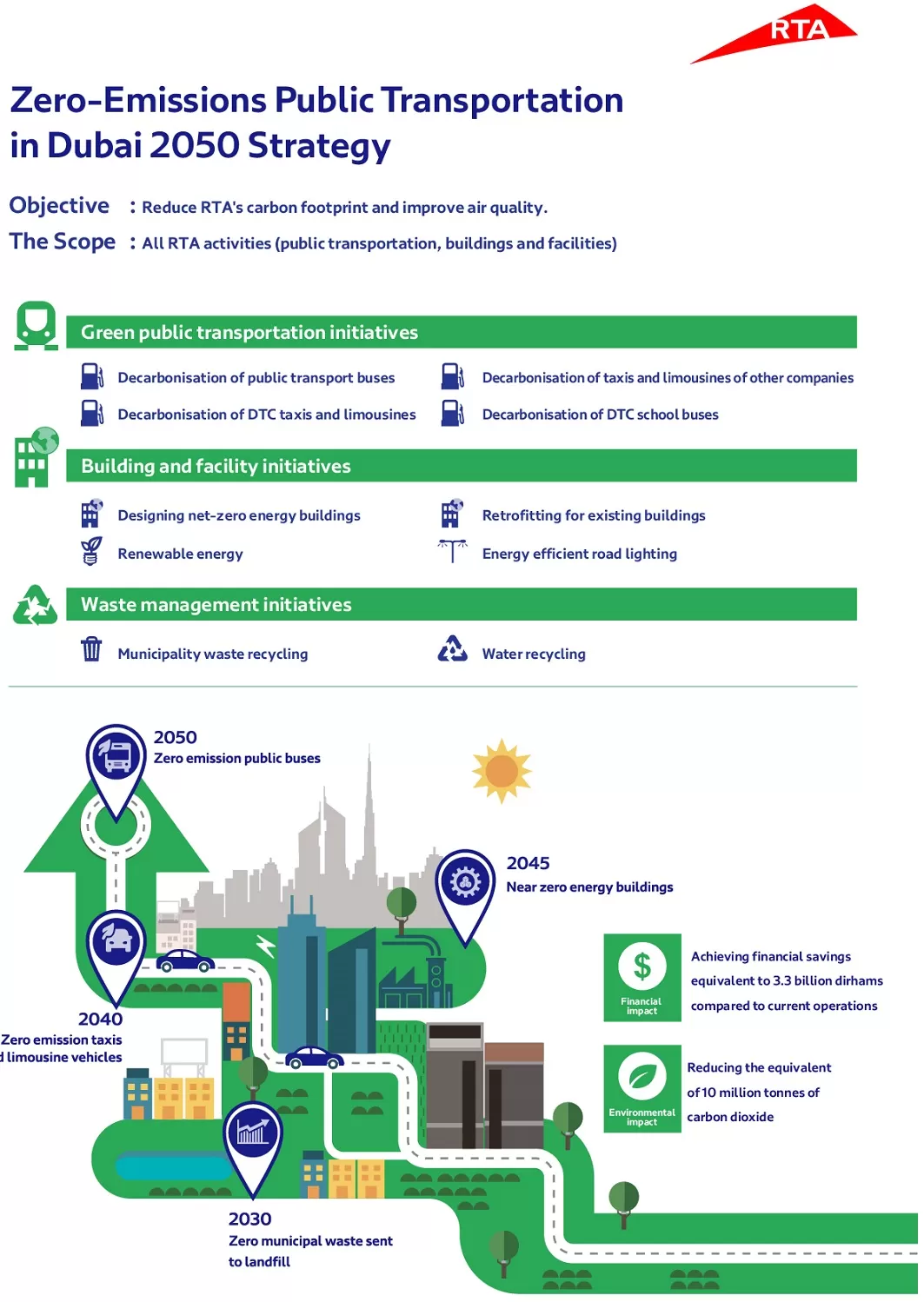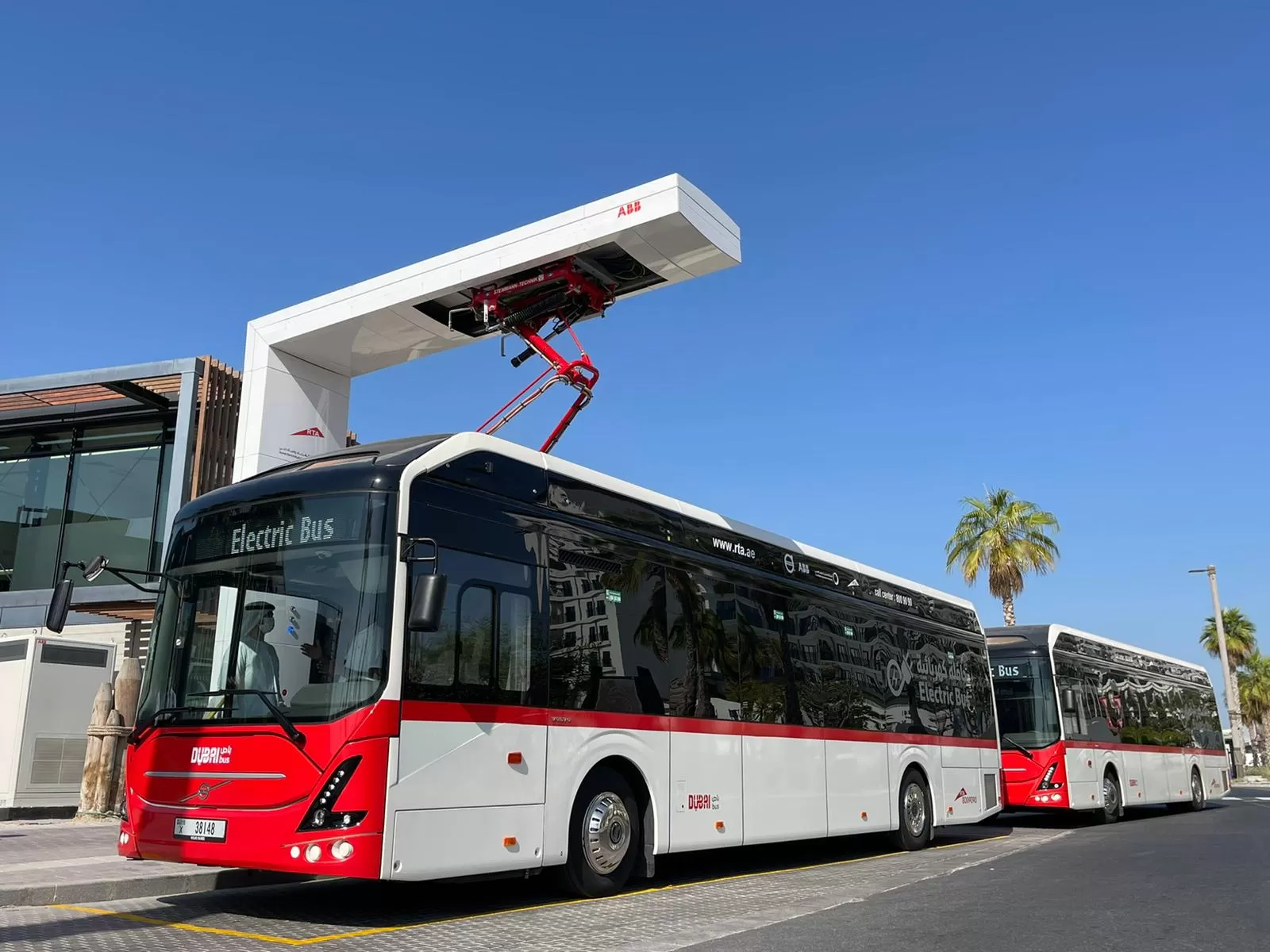UAE: RTA publishes a plan to switch to emissions-free operations by 2050
The first Middle Eastern organisation to create a long-term plan for transitioning to Net-Zero Emission Public Transport by 2050 is Dubai's Roads and Transport Authority (RTA), which has launched its "Zero-Emissions Public Transportation in Dubai 2050" strategy.
By implementing this policy, RTA hopes to lessen its carbon footprint in three areas: waste management, buildings and related facilities, and public transportation.
The new strategy fits in with the UAE's plans for COP28 and the UAE Net Zero by 2050 Strategic Initiative. It also forms a part of RTA's ongoing efforts to increase sustainability maturity levels in roads and transport and attain worldwide leadership in sustainable mobility. In line with the UAE Net Zero by 2050 Strategic Initiative, it aims to increase the adaptability of public transport infrastructure and its effect on climate change by moving from commitments to concrete accomplishments.

RTA's new plan intends to accomplish a number of goals over the next few years, which is consistent with the Dubai Economic Agenda D33's mission to solidify the emirate's position as one of the top urban economies in the world. All cabs, limousines, and public buses must be decarbonized. Near-zero energy structures must be designed. Energy must be sourced from renewable sources. Municipal garbage must also be eliminated by sending zero waste to landfills. In compared to present operations, the plan will result in financial savings of AED3.3 billion and a reduction of carbon dioxide emissions by 10 million tonnes.
The new plan defines a thorough approach to sustainability inside RTA, according to Mattar Al Tayer, Director-General and Chairman of the Board of Executive Directors. Enhancing sustainability and lowering carbon dioxide emissions are its main goals. At the same time, it helps RTA achieve its vision of becoming a global leader in easy, sustainable mobility through cutting-edge road and transport services that raise the standard of the customer experience to a world-class level.
"The new strategy includes collaborations with the business sector that help to implement the strategy over a five-year period as well as 10 initiatives that cover several RTA sectors and agencies. The plan will be reviewed, modified, and updated to reflect the situation's evolving needs.
The policy is in line with the UAE's commitments to environmental and sustainability goals at global, national, and local levels, such as the Paris Climate Agreement and the United Nations Sustainable Development Goals, under the subject "Zero-Emissions Public Transportation in Dubai 2050." Additionally, it is in line with national plans including the UAE Energy Strategy 2050, the UAE Net Zero 2050 Strategic Initiative, the UAE Green Agenda 2030, and the UAE National Climate Change Plan 2050.
"The strategy is also linked to local initiatives, such as Dubai Carbon Abatement Strategy 2030, the Clean Energy Strategy 2050, Dubai Demand Side Management Strategy 2030, the waste management plan in Dubai, Dubai Climate Change Adaptation Strategy, and other relevant strategies, agreements, and initiatives," Al Tayer continued.
The new strategy and its implementation have a number of issues, possibilities, and challenges that the RTA Board of Executive Directors has thought about. These include the price of cutting-edge green technologies, the distribution of goals and how they are reviewed over time, the significance of having access to energy technology providers, especially for electric buses and hydrogen fueling stations, and other elements that affect how the new strategy is carried out.
buses and cabs
In order to achieve net-zero emissions by 2050 in the three areas of green public transport, buildings and facilities, and waste management, the new policy sets the target rates to be attained over the next years. By 2030, 10% of public transportation buses must be converted to electric and hydrogen buses. This percentage will rise to 20% in 2035, 40% in 2040, 80% in 2045, and finally 100% in 2050. Additionally, it calls for the conversion of 30% of the emirate's taxis and limos to electric and hydrogen cars by 2030. This percentage would rise to 50% by 2035 and 100% by 2040.
By 2030, the plan seeks to convert 10% of DTC's school buses to electric and hydrogen vehicles. This percentage will rise to 30% in 2035, 50% in 2040, 80% in 2045, and 100% in 2050.
Structures and amenities

The plan calls for installing solar cell systems throughout RTA's buildings and infrastructure. According to feasibility assessments, solar panel installations will start on 24 buildings and facilities before 2025 and spread to all other structures and facilities after that. The objective is to modernise and adapt 74 percent of the structures by 2030, 83 percent by 2035, and 100 percent by 2045.
Beginning in 2025, all new construction will use almost no energy.
If the application is continued on all new projects, existing streetlights will also be adapted such that every single one of them is 100% energy efficient.
handling of waste
To achieve the aim of zero municipal trash going to landfills, programmes will be put in place to reuse and recycle 100 percent of municipal garbage by 2030. By 2050, RTA's buildings and facilities will also be using 40 percent more recycled water.
Outstanding accomplishments
RTA has accomplished a lot in terms of sustainability. Its energy and green economy activities between 2014 and 2022 have helped save about 360 gigawatt-hours of power, 300 million gallons of water, 88 million litres of gasoline, and 10 million litres of diesel. This results in savings of almost AED420 million and the avoidance of 416,000 tonnes of equivalent emissions.
In 2018, RTA became the first organisation in the world's roads and public transport sector to publish a sustainability report that complied with ISAE3000 and GRI requirements. RTA also ratified the UN Global Charter for Sustainable Development in 2020. This was accomplished by matching the information in the sustainability reports with the objectives of the UN, which address issues such as poverty, inequality, climate change, environmental degradation, peace, justice, human rights, and the fight against corruption.
